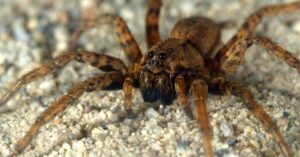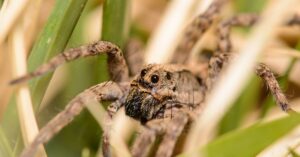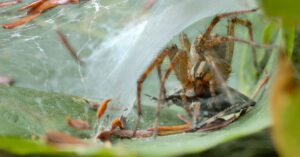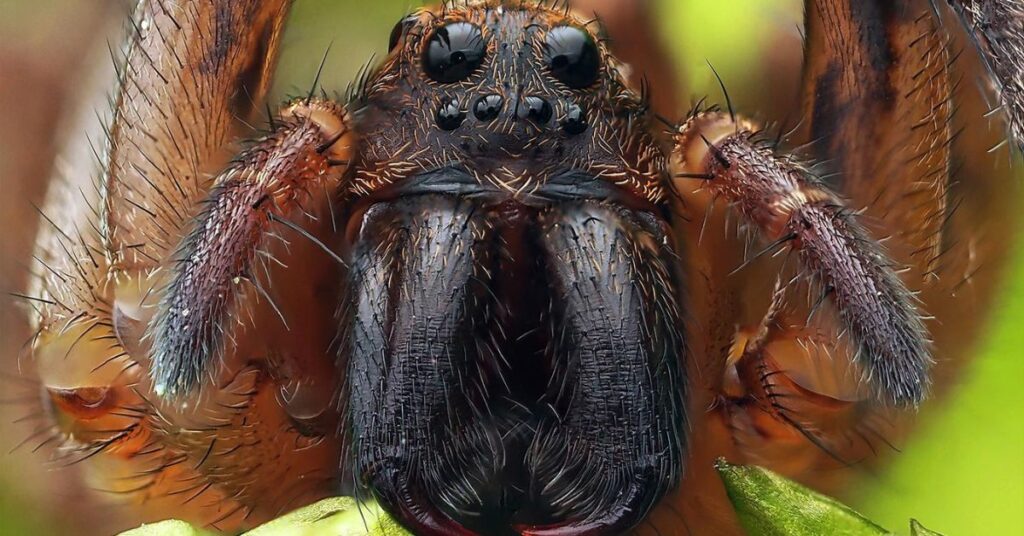
Are wolf spiders poisonous? Firstly, these hardy little spiders are the most common spider species in the world. Mainly found in Europe and the US, you’ve probably come across them at some point and wondered if they’re poisonous. Let’s answer that question immediately.
In short, no. Wolf spiders aren’t poisonous to people, although they do have a very painful bite. Of course, some people are allergic to spider venom in which case the symptoms would be more severe. If you were to get bitten, you should also look out for signs of infection as that could be much worse than the initial bite.
Now we’ve managed to answer the main burning question, let’s take a more in-depth look at this interesting, and quite unique, little spider.
Appearance
These spiders belong to the Lycosidae family, and it is estimated that there are over 2,500 species globally from the largest being the Carolina Wolf Spider (Hogna carolinensis) at 1.3 inches to the smallest being the Minicosa neptuna at 0.04 inches.
Wolf spiders are relatively distinguishable with their pale markings or stripes and are usually dark brown. They have eight eyes arranged in three rows.
The bottom row consists of four small eyes, the middle row has two very large eyes, and the top row has two medium-sized eyes. Unlike most other arachnids, which are generally blind or have poor vision, wolf spiders have excellent eyesight.
Looking After Their Young
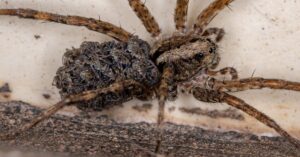
Wolf spiders are unique in the way that they carry their eggs.
The egg sac is attached to the spinnerets at the end of the abdomen, allowing the spider to carry her unhatched young with her.
Another aspect unique to wolf spiders is their method of care of young.
Immediately after the spiderlings emerge from their protective silken case, they climb up their mother’s legs and crowd onto her abdomen.
The mother carries the spiderlings for several weeks before they are large enough to disperse and fend for themselves.
No other spiders are currently known to carry their young on their backs for any period of time.
Habitat
Wolf spiders prefer to live on or underground, in dark places, and like to hide, waiting to ambush an innocent small invertebrate.
Outside, you are more likely to find them under a rock, inside a log, hiding under leaves and plants or even in the grass.
If they invade your home, you’re more likely to spot them in warm, humid areas such as your basement, your garage, your shed, or even your doorway.
What do Wolf Spiders Eat?
The diet of a wolf spider involves crickets, ants, flies and other small invertebrates.
Wolf spiders are not like other spiders and are more similar to tarantulas when it comes to web spinning.
They are hunters and use their long legs to run quickly and catch their food, they never spin a web to catch prey.
They only hunt at night, as they are solitary, nocturnal creatures so you won’t find them during the day snacking on a grasshopper for example.
How Painful is a Wolf Spider Bite?
A bite from a wolf spider is similar to getting stung by a wasp. Symptoms include swelling, mild pain, and itching.
The mild pain should recede after a few minutes, the swelling will go down slowly and the itching should diminish after a few days.
Australian wolf spiders have also been associated with necrotic wounds, but careful study has shown them not to produce such results.
Signs that you may have to seek medical treatment for your bite include:
- Headache or feeling dizzy
- A rash that spreads outward from the site of the bite and may include itching that spreads
- Cramping or having tight muscles around the bite
- Sweating whether you feel hot or cold
- Nausea or vomiting
- Trouble breathing
- Fever
- Weakness or uncontrollable shaking
Prevention
Probably the best way to prevent getting bitten is to be aware of your surroundings.
If you are indoors, you can shake out items like boots before putting them on or shake a box before picking it up.
Keeping your house free from clutter is another way to prevent spiders taking refuge and hiding. Of course, you can always make a noise as a way of warning the spider that you’re coming.
Remember that wolf spiders are not aggressive creatures and will only bite if they feel threatened.
In summary, although wolf spider bites are not poisonous, they are painful and there is the possibility that you will require medical treatment. However, providing you’ve cleaned the wound appropriately and are not allergic to spider bites, there should be no need to consult a doctor. Phew!

